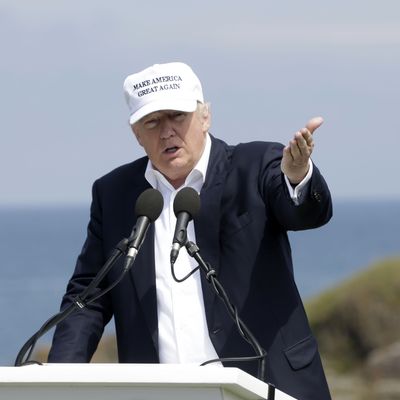
As Donald Trump assured us during the campaign, someday he’ll turn his business into a “blind trust” operated by his children (right after they change the definition of what a “blind trust” is). For now, it appears Trump is still looking out for his own business interests by combining them with the interests of the president-elect.
The latest example comes from the New York Times, which reported on Monday evening that during a meeting with Nigel Farage days after the election, Trump encouraged the British politician and his pro-Brexit entourage to oppose offshore wind farms that threaten to ruin the view at one of his Scottish golf courses. Last year, Trump lost a long legal battle to block the construction of a wind farm near his resort.
“He did not say he hated wind farms as a concept; he just did not like them spoiling the views,” said Andy Wigmore, a media consultant who attended the meeting. Wigmore said he and his associates were already opposed to wind farms, but Trump “did suggest that we should campaign on it” and “spurred us in and we will be going for it.”
Trump spokesperson Hope Hicks initially denied the report, then stopped responding when informed that Wigmore described the conversation with Trump. But Trump took matters into his own hands, blasting the “crooked media” for focusing on his conflicts of interest. He tweeted, a short time after the Times story was published:
Trump also declared that he would like Farage to be ambassador to the United States, though as a Downing Street spokesman noted, the British “already have an excellent ambassador to the U.S.”
Once again, Trump’s Twitter musings have proved revealing (and not only because they suggest he’s unaware that U.S. presidents don’t select ambassadors from other nations).
In recent days, journalists have tried to get some idea of Trump’s potential business conflicts, which is difficult because he never released his tax returns. After analyzing Trump’s financial filings, the Washington Post concluded over the weekend, “At least 111 Trump companies have done business in 18 countries and territories across South America, Asia and the Middle East.” Some, like a potential hotel project in Saudi Arabia, were launched during his campaign.
As ethics experts from both sides of the aisle complained about these conflicts (even the New York Post), the Trump team has faced questions about when, exactly, the Trump Organization will be transferred to the president-elect’s children, and what that setup will look like. On Sunday, Reince Priebus, Trump’s future chief of staff, told CNN:
Obviously we will comply with all of those laws and we will have our White House counsel review all of these things. We will have every ‘i’ dotted and every ‘t’ crossed, and I can assure the American people that there wouldn’t be any wrongdoing or any sort of undue influence over any decision-making.
And during an interview with Fox News on Monday, Trump campaign manager Kellyanne Conway said “experts behind the scenes” are working out the details, and Trump’s kids are on top of it.
But now Trump has confirmed that he doesn’t actually care about creating a clear line between his business and the presidency — which means that there will likely be no line. While many have pointed to the Constitution’s Emoluments Clause as a check on Trump monetizing the presidency, it seems unlikely that it could be used to hold the president legally accountable for accepting “gifts” from foreigners, and it’s even less likely that a Republican Congress would try to impeach Trump on those grounds. As New York’s Eric Levitz put it, “The only constraints on Trump’s freedom to leverage his public power for private profit is political disapproval and his own sense of shame.”
And suffice it to say the man who presented himself as a major donor to a charity for children with AIDS, though he hadn’t given a dime, doesn’t have a lot of shame.
Before Trump made his Twitter admission, Talking Points Memo’s Josh Marshall argued that given what we know about Trump, describing his business as a “conflict of interest” is the wrong way to frame the issue:
At a minimum, we use this construct on the assumption that people are acting in good faith and not advancing their private interests with the powers of their office. That’s the problem. The concept simply doesn’t apply well when you are talking is a public official who is by design using their public office for profit. Everything we’ve seen from President-Elect Trump so far suggests this all comes so naturally to him that at some level he doesn’t even see anything wrong with it. Indeed, this shouldn’t be surprising since it matches with his entire career, in which he has used every angle on offer - publicity, stardom, connections with government officials, etc. - to make money or as tools he can leverage to make money for his private businesses.
Trump is right that those suddenly concerned about his business dealings are late to the game. The issues were widely covered during the campaign, and Trump even mused back in 2000, “It’s very possible that I could be the first presidential candidate to run and make money on it.”
People elected him anyway, so why should he get serious about separating his business and political interests now, when there are even fewer consequences?






























